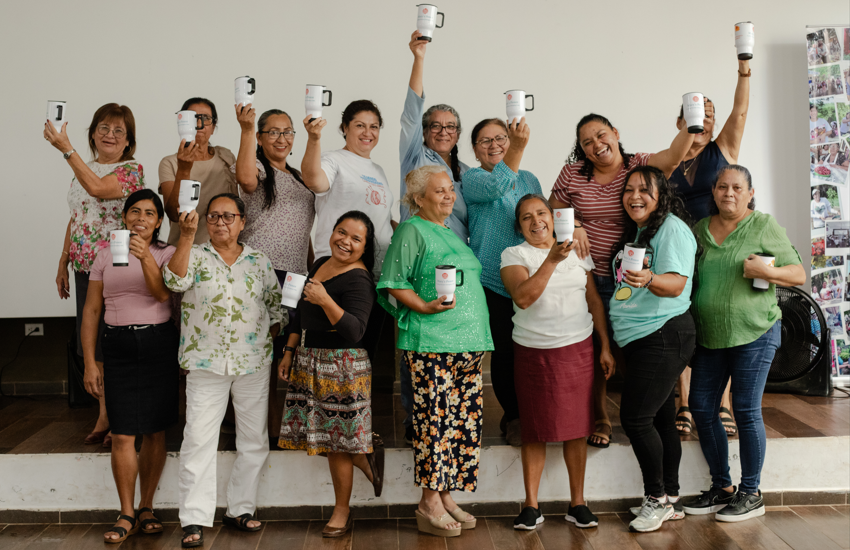
Grassroots organizing is a demanding, time-intensive job, and too often goes unpaid. Across communities, women step up to lead because they care about their communities and the dignity of other women. This lack of compensation limits sustainability and strains personal finances.
At Mary’s Pence, we believe in honoring this labor. That’s why our ESPERA program is offering stipends to local group coordinators. After a year of implementation, what we’ve seen is powerful: women leaders feel seen, respected, and newly energized to build long-term, lasting change. The stipends also provide income that allows the coordinators to take time away from their own small businesses to support the work of the organization.
Mary’s Pence has a small staff in Central America—3 women supporting 14 partner organizations in 5 countries. We depend on the local leaders in each of our partner organizations, the majority of whom are unpaid volunteers, to lead the organizations and support the implementation of ESPERA’s goals—economic security, strong local leaders, family agriculture, and emotional wellness.
In this work, the coordinator’s tasks include providing ongoing support to women’s economic initiatives, managing and analyzing loan processes, maintaining accurate records, and reporting on program impact. These leaders regularly participate in planning, training, and strategic meetings with Mary’s Pence staff to ensure alignment with the organization’s and Mary’s Pence goals. These actions collectively contribute to the effective implementation and growth of the ESPERA Program, strengthening the economic empowerment of participants.
More Than Just a Payment
A $200 stipend feels like a milestone for the ESPERA’s 16 coordinators and strengthens their sense of responsibility. “It was a moment of many emotions—surprise and happiness—because I had never received any recognition,” Yanira, one coordinator from El Salvador, shared.
Dora Alicia, another coordinator, expressed how being paid for her time changed her perspective. “When I learned we would receive a stipend, I felt grateful and satisfied because it recognized my work. Now, I feel more responsibility in my role.”
The recognition payment is not just economic support but a symbol of trust and respect. Their time and commitment are essential for Mary’s Pence. Eva, Mary’s Pence ESPERA team, explained, “The coordinators are now more committed to the program. They plan activities based on strategic priorities and offer deeper support to the women’s economic initiatives and emotional wellness.”
Since receiving stipends, coordinators have become more proactive and provide consistent follow-through on the groups’ financial commitments, leading to more timely paybacks of the loans and the women feeling more supported in general.
Ownership, Empowerment, and Personal Growth
Through their stipended roles, coordinators are learning skills they once thought were out of reach—public speaking, basic accounting, digital tools, and organizational leadership. The impact of the financial support can be summed up in three words: Ownership. Empowerment. Growth.
Marylin, from ACOMEST in El Salvador, shares, “Since I began receiving a stipend for my time and work as a coordinator, my perspective on the role changed significantly. Before, I saw it more as a volunteer commitment, but when I received financial compensation, I felt my work was valued and formally recognized. This elevated my sense of responsibility and professionalism and motivated me to invest more energy and time in improving processes, supporting the team, and seeking more effective solutions.”
ESPERA Program Lead in Central America, Mabel observes, “Before, they didn’t see themselves as leaders. Now they feel important because they are, and are beginning to think long-term about their organizations.”
“I have learned several new skills that have helped me grow professionally and personally, especially in communicating and relating to other women. I’ve learned to listen with more empathy, to express myself more clearly, and to be more open to different perspectives. Working with women in different contexts has shown me the strength that exists in collaboration, mutual, and professional support,” adds Briseyda.
“One of the most fulfilling parts of this work is seeing the progress women make in understanding their rights and developing their initiatives. I also deeply value the times when we, as women leaders, come together in a space where I feel safe and supported—these gatherings allow us to plan, learn, and strengthen the support we provide to other women in our organizations.” Yanira, shares.
Bringing the Growth Back to Their Communities
ESPERA coordinators are not only growing individually—they are also bringing that growth back to their communities. The stipend enables them to make regular visits to women-led initiatives. During each visit, coordinators inquire if the women are keeping track of their sales and expenses, profits, or if they need support with their records. They bring a form called the “ficha de seguimiento,” a template to guide these conversations and ensure that each woman’s needs are heard and addressed.
In some communities, they’re planning peer exchanges between organizations focused on emotional wellness, entirely on their initiative. All of this reinforces the long-term sustainability of the program.
The stipend gives women the means to show up, the motivation to grow, and the affirmation that their leadership matters. ESPERA coordinators are not just beneficiaries of a program—they are the drivers of it.
